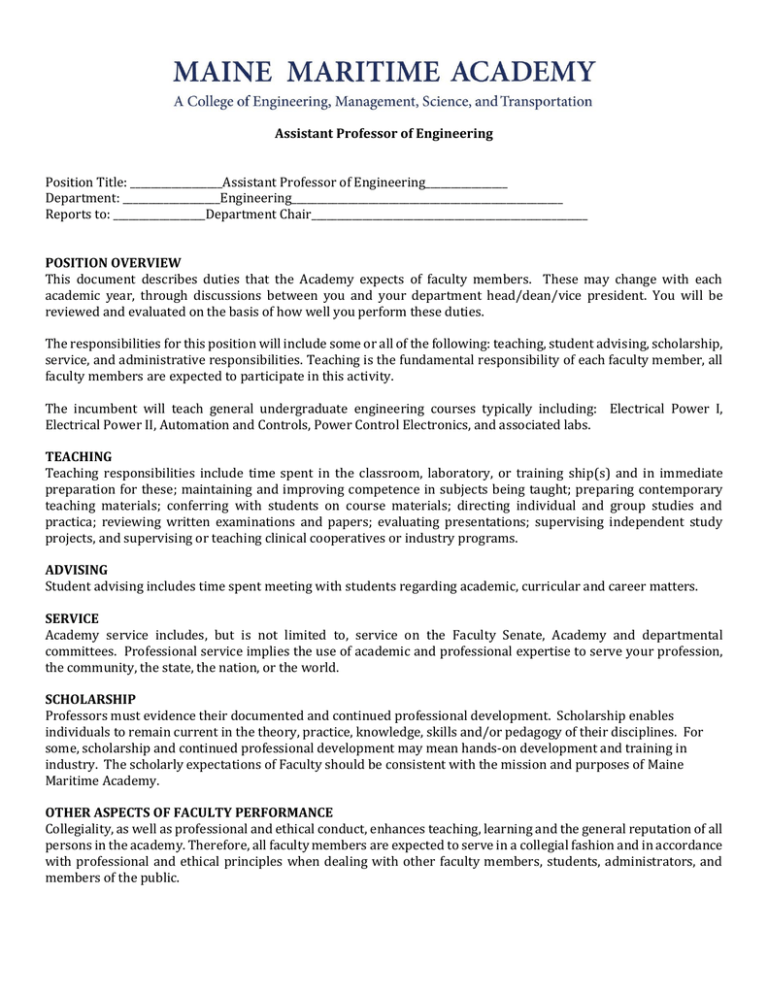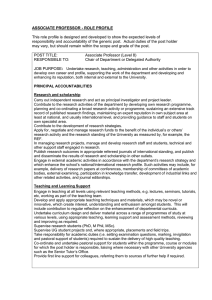Assistant Professor Engineering
advertisement

Assistant Professor of Engineering Position Title: __________________Assistant Professor of Engineering________________ Department: ___________________Engineering_____________________________________________________ Reports to: __________________Department Chair______________________________________________________ POSITION OVERVIEW This document describes duties that the Academy expects of faculty members. These may change with each academic year, through discussions between you and your department head/dean/vice president. You will be reviewed and evaluated on the basis of how well you perform these duties. The responsibilities for this position will include some or all of the following: teaching, student advising, scholarship, service, and administrative responsibilities. Teaching is the fundamental responsibility of each faculty member, all faculty members are expected to participate in this activity. The incumbent will teach general undergraduate engineering courses typically including: Electrical Power I, Electrical Power II, Automation and Controls, Power Control Electronics, and associated labs. TEACHING Teaching responsibilities include time spent in the classroom, laboratory, or training ship(s) and in immediate preparation for these; maintaining and improving competence in subjects being taught; preparing contemporary teaching materials; conferring with students on course materials; directing individual and group studies and practica; reviewing written examinations and papers; evaluating presentations; supervising independent study projects, and supervising or teaching clinical cooperatives or industry programs. ADVISING Student advising includes time spent meeting with students regarding academic, curricular and career matters. SERVICE Academy service includes, but is not limited to, service on the Faculty Senate, Academy and departmental committees. Professional service implies the use of academic and professional expertise to serve your profession, the community, the state, the nation, or the world. SCHOLARSHIP Professors must evidence their documented and continued professional development. Scholarship enables individuals to remain current in the theory, practice, knowledge, skills and/or pedagogy of their disciplines. For some, scholarship and continued professional development may mean hands-on development and training in industry. The scholarly expectations of Faculty should be consistent with the mission and purposes of Maine Maritime Academy. OTHER ASPECTS OF FACULTY PERFORMANCE Collegiality, as well as professional and ethical conduct, enhances teaching, learning and the general reputation of all persons in the academy. Therefore, all faculty members are expected to serve in a collegial fashion and in accordance with professional and ethical principles when dealing with other faculty members, students, administrators, and members of the public. DUTIES Teach at the undergraduate level in areas allocated by the Department Head or Dean. Contribute to the development, planning and implementation of a high quality curriculum. Assist in the development of learning materials, preparing lesson plans and maintaining records to monitor student progress, achievement and attendance. Participate in departmental and faculty seminars aimed at sharing research outcomes and building interdisciplinary collaboration within and outside the department. Participate in the development, administration and marking of exams and other assessments of students within and without your department. Inform students of their progress by promptly returning assignments, quizzes, papers and exams. Contribute to departmental, faculty, or Academy-wide working groups or committees as requested. Maintain one’s own continuing professional development. May be required to participate as an instructional faculty member and/or engineering watch officer onboard the Training Ship State of Maine during cruise. Expected to advise students in the engineering undergraduate programs, and assist in department academic and administrative functions including serving on departmental and campus-wide committees. All academic staff are expected to demonstrate their ongoing commitment to academic excellence; that is, to the conduct of possible research, publication, teaching and other forms of knowledge transfer, at the highest levels of achievement. ESSENTIAL SKILLS Teaching and other forms of public presentation. Ability to supervise academic work by undergraduate students. Ability to manage time and work to strict deadlines. Ability to work collaboratively. Excellent interpersonal, organizational and communication skills. Ability to maintain composure in stressful situations. High degree of professionalism. Integrity and the ability to maintain confidentiality. Ability to adapt to changing priorities and conditions. REQUIRED QUALIFICATIONS College degree from an accredited institution. Professional maritime or industrial experience Excellent communication and leadership skills DESIRABLE QUALIFICATIONS Bachelor’s degree or higher in an appropriate discipline of engineering or engineering technology (marine, mechanical, electrical, naval or industrial) or related field Current U.S. Coast Guard license with appropriate STCW endorsements U.S. Coast Guard Electro-Technical Officer or Equivalent Rating Academic instructional experience PHSICAL/ENVIROMENTAL FACTORS Typical classroom and office environment are in multi-story buildings with elevator access. Work in the labs may require: Climbing up and down ladders and gangways, lifting and carrying materials, occasional work in excess heat, cold, dampness or dry atmospheric conditions. Those required to participate on the training cruise must be capable of the following: o Living and working in cramped spaces on a rolling vessel and maintaining balance on a moving deck o Rapidly donning an exposure suit and other lifesaving gear o Opening and closing watertight doors o o Occasionally lift and move up to 50 pounds. Climbing steep stairs or vertical ladders without assistance
